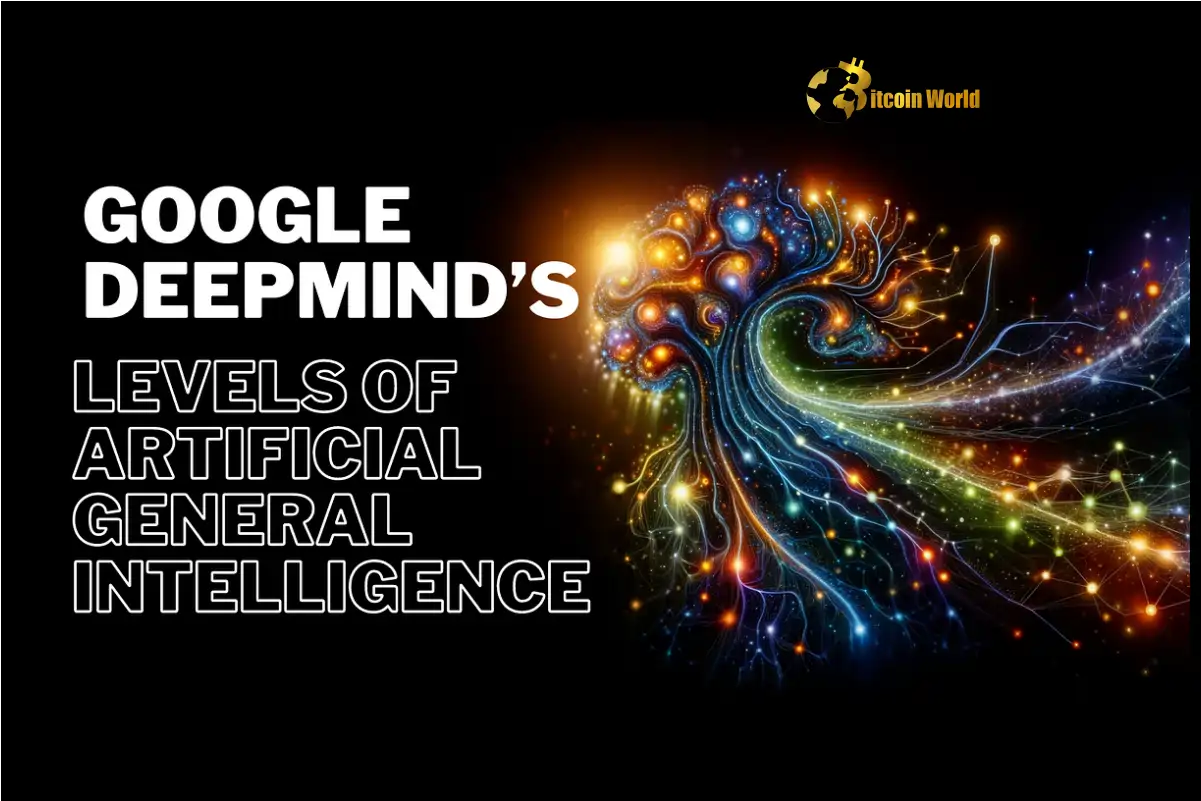In the rapidly evolving world of artificial intelligence, where breakthroughs seem to happen daily, Google DeepMind has dropped a bombshell – a comprehensive 145-page paper dedicated to AGI safety. For those in the crypto space keeping an eye on technological disruptions, this is big news. Why? Because the implications of Artificial General Intelligence (AGI) could reshape everything, including the digital landscape we’re building with blockchain and cryptocurrencies. But is this detailed report enough to quell the growing concerns, or will it only fuel the fire of skepticism?
DeepMind’s Deep Dive into AGI Safety: What’s the Alarm?
DeepMind’s extensive paper tackles a subject that’s been brewing in the AI community for years: Artificial General Intelligence (AGI). AGI, in simple terms, is AI that can perform any intellectual task a human being can. While some dismiss it as science fiction, major players like Anthropic are sounding the alarm, warning that AGI isn’t a distant dream but a looming reality. DeepMind, echoing these concerns, predicts AGI could arrive as soon as 2030 and highlights the potential for “severe harm,” even mentioning “existential risks” – scenarios that could, in the most extreme case, wipe out humanity.
Key takeaways from DeepMind’s AGI safety paper:
- AGI by 2030: DeepMind anticipates “Exceptional AGI” within this decade, defined as AI surpassing 99% of skilled adults in non-physical and metacognitive tasks.
- Severe Harm Potential: The paper warns of significant dangers, including extreme, though vaguely defined, “existential risks.”
- Recursive AI Improvement: DeepMind acknowledges the plausibility of AI systems enhancing themselves, leading to potentially uncontrollable intelligence growth.
This isn’t just another tech paper; it’s a stark warning from one of the leading AI labs about the potential downsides of their own creations. For crypto enthusiasts, understanding these risks is crucial as AI and blockchain technologies increasingly converge.
AI Risk Mitigation: DeepMind’s Approach vs. Competitors
Interestingly, DeepMind’s paper doesn’t shy away from comparing its AI risk mitigation strategies with those of other major AI labs, Anthropic and OpenAI. According to the paper, DeepMind emphasizes “robust training, monitoring, and security” more strongly than Anthropic. They also express reservations about OpenAI’s optimism in automating AI alignment research – the crucial process of ensuring AI goals align with human values.
Furthermore, DeepMind casts doubt on the near-term emergence of superintelligent AI – AI surpassing human capabilities in all domains, a concept OpenAI recently shifted its focus towards. DeepMind suggests that without “significant architectural innovation,” superintelligence may not be on the immediate horizon, if ever.
DeepMind’s Comparative Stance on AI Safety:
| Approach | DeepMind | Anthropic | OpenAI |
|---|---|---|---|
| Emphasis on Robust Training, Monitoring, Security | High | Lower (as per DeepMind) | – |
| Automation of Alignment Research | Skeptical | – | Bullish (as per DeepMind) |
| Near-term Superintelligence | Doubtful | – | Focus Shift (from AGI) |
This comparative analysis highlights the varying perspectives within the AI industry on managing potential dangers, a discussion that’s vital for anyone concerned about the future impact of advanced technologies.
Artificial General Intelligence: A Real Threat or Just Hype?
Despite DeepMind’s detailed report, skepticism about the imminence and even the definition of Artificial General Intelligence persists. Heidy Khlaaf, chief AI scientist at AI Now Institute, argues that the very concept of AGI is too vaguely defined to be scientifically evaluated. This raises a crucial question: are we chasing a phantom threat, or is the danger very real?
Matthew Guzdial, an AI researcher at the University of Alberta, further challenges a key concern raised in DeepMind’s paper – recursive AI improvement. Guzdial states that there’s no evidence to support the idea of AI autonomously and exponentially improving itself, a concept central to singularity arguments.
Expert Skepticism on AGI and Recursive Improvement:
- AGI Definition Concerns: Experts like Heidy Khlaaf question the scientific rigor of the AGI concept itself.
- Recursive Improvement Doubts: Matthew Guzdial points out the lack of empirical evidence for AI’s self-improvement leading to runaway intelligence.
This skepticism is important. In the crypto world, we’re used to navigating hype cycles and distinguishing between genuine innovation and overblown promises. A critical approach to claims about AGI, even from major labs, is warranted.
The Danger of Recursive AI Improvement: A Double-Edged Sword?
DeepMind’s paper emphasizes the potential peril of “recursive AI improvement,” where AI systems become capable of designing even more advanced AI. This feedback loop, they argue, could lead to unforeseen and potentially harmful levels of intelligence. While Matthew Guzdial remains skeptical about its immediate feasibility, the concept itself raises valid concerns. Imagine AI not just automating tasks, but automating its own evolution – the implications are staggering.
However, even if full recursive self-improvement is distant, a related and perhaps more immediate risk is AI reinforcing its own errors. Sandra Wachter, an Oxford researcher, highlights the danger of AI models learning from their own “hallucinations” or inaccurate outputs proliferating online. As generative AI floods the internet with AI-generated content, future AI models risk being trained on data polluted with inaccuracies, creating a cycle of misinformation.
Concerns around AI Self-Improvement and Data Pollution:
- Recursive Improvement Risks: Even if not immediately likely, the concept of AI designing smarter AI raises long-term safety questions.
- AI Hallucination Feedback Loop: A more present danger is AI models learning from inaccurate AI-generated content, perpetuating and amplifying errors.
- Impact on Truth and Search: As chatbots become search tools, the risk of users being misled by convincingly presented “mistruths” increases.
For the crypto community, which values verifiable truth and decentralization, the prospect of AI-driven misinformation and the erosion of reliable data sources is particularly concerning. It underscores the need for robust verification mechanisms and critical evaluation of AI-generated information.
Navigating AGI Safety: DeepMind’s Proposed Path Forward
Despite the skepticism, DeepMind’s paper doesn’t just raise alarms; it also proposes solutions. They advocate for developing techniques to:
- Restrict access for bad actors: Preventing malicious entities from controlling or exploiting hypothetical AGI.
- Improve AI understanding: Developing methods to better comprehend how AI systems make decisions and take actions – crucial for accountability and control.
- Harden AI environments: Creating secure and controlled environments in which AI operates to limit potential harm.
DeepMind acknowledges that these are nascent areas of research with many “open problems.” However, they stress the urgency of addressing these AI safety challenges proactively. Their core message is clear: the transformative potential of AGI demands responsible development and careful planning to mitigate potential “severe harms.”
The AGI Debate: Unsettled and Urgent
Ultimately, DeepMind’s extensive paper, while comprehensive, is unlikely to definitively resolve the ongoing debates surrounding AGI. The questions of when, or even if, true Artificial General Intelligence will arrive, and what the most pressing AI risk factors are, remain open and hotly contested. What is clear is that the conversation is crucial, and DeepMind’s contribution serves as a vital catalyst for continued discussion and research.
For those in the cryptocurrency and blockchain space, these discussions are not abstract academic exercises. The technologies we are building and investing in are converging with AI in profound ways. Understanding the potential benefits and, crucially, the potential risks of advanced AI is essential for navigating the future of technology and ensuring a safe and prosperous digital world.
To learn more about the latest AI market trends, explore our article on key developments shaping AI features.






